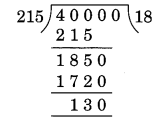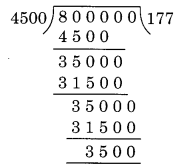Solutions For All Chapters Maths Class 6
NCERT Solutions for Class 6 Maths Chapter 1 Knowing Our Numbers Exercise 1.2
Ex 1.2 Class 6 Maths Question 1.
A book exhibition was held for four days in a school. The number of tickets sold at the counter on the first, second, third and final day was respectively 1094, 1812, 2050 and 2751. Find the total number of tickets sold on all the four days.
Solution:
Number of tickets sold on the first day = 1094
Number of tickets sold on the second day = 1812
Number of tickets sold on the third day = 2050
Number of tickets sold on the final day = 2751
∴ Total number of tickets sold on all the four days = 1094 + 1812 + 2050 + 2751 = 7,707.
Ex 1.2 Class 6 Maths Question 2.
Shekhar is a famous cricket player. He has so far scored 6980 runs in test matches. He wishes to complete 10,000 runs. How many more runs does he need?
Solution:
Shekhar has so far scored 6980 runs
He wishes to complete 10,000 runs.
Therefore total number of runs needed by him = 10,000 – 6980 = 3020 runs
Ex 1.2 Class 6 Maths Question 3.
In an election, the successful candidate registered 5,77,500 votes and his nearest rival secured 3,48,700 votes. By what margin did the successful candidate win the election?
Solution:
Number of votes secured by the successful candidate = 5,77,500
Number of votes secured by his nearest rival = 3,48,700
Therefore, margin of votes to win the election = 5,77,500 – 3,48,700 = 2,28,800
Ex 1.2 Class 6 Maths Question 4.
Kirti bookstore sold books worth ₹2,85,891 in the first week of June and books worth ₹4,00,768 in the second week of the month. How much was the sale for the two weeks together? In which week was the sale greater and by how much?
Solution:
Books sold in first week of June worth ₹2,85,891
Books sold in second week of the month worth ₹4,00,768
Therefore, total sale of books in the two weeks together
= ₹2,85,891 + ₹4,00,768 = ₹6,86,659
In the second week of the month, the sale of books was greater.
Difference of the sale of books
= ₹4,00,768 – ₹2,85,891 = ₹1,14,877
Hence, in second week of june, the sale of books was more by ₹1,14,877.
Ex 1.2 Class 6 Maths Question 5.
Find the difference between the greatest and the least numbers that can be written using the digits 6, 2, 7, 4, 3 each only once.
Solution:
Given digits are 6, 2, 7, 4, 3
Greatest number = 76432
Least number = 23467
Therefore, difference = 76432 – 23467 = 52,965
Ex 1.2 Class 6 Maths Question 6.
A machine, on an average, manufactures 2,825 screws a day. How many screws did it produce in the month of January, 2006?
Solution:
Number of screws manufactured in a day = 2,825.
Number of screws manufactured in month of January = 31 x 2825 = 87,575
Ex 1.2 Class 6 Maths Question 7.
A merchant had ₹78,592 with her. She placed an order for purchasing 40 radio sets at ₹1200 each. How much money will remain with her after the purchase?
Solution:
Amount of money with the merchant = ₹78,592
Number of radio sets = 40
Price of one radio set = ₹1200
Therefore, cost of 40 radio sets = ₹1200 x 40 = ₹48,000
Remaining money with the merchant = ₹78,592 – ₹48000 = ₹30,592
Hence, amount of ₹30,592 will remain with her after purchasing the radio sets.
Ex 1.2 Class 6 Maths Question 8.
A student multiplied 7236 by 65 instead of multiplying by 56. By how much was his answer greater than the correct answer?
Solution:
Student has multiplied 7236 by 65 instead of multiplying by 56.
Difference between the two multiplications = (65 – 56) x 7236 = 9 x 7236 = 65124
(We don’t need to do both the multiplied)
Hence, the answer greater than the correct answer is 65,124.
Ex 1.2 Class 6 Maths Question 9.
To stitch a shirt, 2 m 15 cm cloth is needed. Out of 40 m cloth, how many shirts can be stitched and how much cloth will remain?
NCERT Solutions For Class 6 Maths Knowing Our Numbers
Solution:
Total length of the cloth = 40 m = 40 x 100 cm = 4000 cm.
Cloth needed to stitch a shirt = 2 m 15 cm = 2 x 100 + 15 cm = 215 cm
Therefore, number of shirts stitched = 4000/215
So, the number of shirts stitched = 18 and the remaining cloth = 130 cm = 1 m 30 cm
Ex 1.2 Class 6 Maths Question 10.
Medicine is packed in boxes, each weighing 4 kg 500 g. How many such boxes can be loaded in a van which cannot carry beyond 800 kg?
NCERT Solutions For Class 6 Maths Knowing Our Numbers
Solution:
Weight of one box = 4 kg 500 g = 4 x 1000 + 500 = 4500 g
and 800 kg = 800 x 1000 = 800000 g
Therefore, 177 boxes can only be loaded in the van.
Ex 1.2 Class 6 Maths Question 11.
The distance between the school and the house of a student is 1 km 875 m. Everyday she walks both ways. Find the total distance covered by her in six days.
Solution:
Distance between school and house = 1 km 875 m = (1000 + 875) m = 1875 m.
Distance travelled by the student in both ways = 2 x 1875 = 3750 m
Distance travelled in 6 days = 3750 m x 6 – 22500 m = 22 km 500 m.
Hence, total distance covered in six days = 22 km 500 m.
Ex 1.2 Class 6 Maths Question 12.
A vessel has 4 litres and 500 ml of curd. In how many glasses, each of 25 mL capacity, can it be filled ?
Solution:
Quantity of curd in a vessel = 4 1 500 mL = (4 x 1000 + 500) mL = 4500 mL.
Capacity of 1 glass = 25 mL
Therefore number of glasses = 4500/25 = 180



Leave a Reply